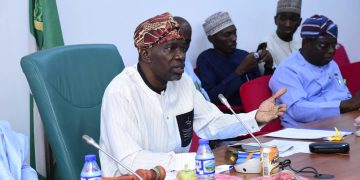By Michael Agbaji
Director General and Chief Executive Officer of the National Identity Management Commission (NIMC), Engr. Abisoye Coker-Odusote, on Wednesday meet with the Senate Committee on National Identity and National Population to discuss some of the challenges facing the Commission and the plan on how to address them.
The meeting, chaired by the committee’s Chairman, Senator Abdul Ningi, provided a platform for the NIMC DG to present an overview of issues confronting the agency, ranging from infrastructural constraints to logistical challenges in NIN enrollment
In Coherent and inclusive identity system governed by a less restrictive, cumbersome, discriminatory, and punitive regime, emphasizing data protection rights, cost efficiency, and alignment with global best practices.
“The bill seeks to redress the prevailing challenges and limitations of the extant legislation and establish a more robust and effective national identity management system conducive to the country’s advancement and prosperity moving forward.
“The bill introduces novel provisions such as the establishment of a national identity registry, the centralization of a national identity database, the issuance of multifaceted national identity cards, and the integration of biometric technology to fortify security measures.
“We urge stakeholders to engage with us on this matter, offering their insights, expertise, and counsel grounded in scientific principles and global knowledge accumulation. By fostering collaboration and support, we aim to ensure that this bill, once enacted, upholds transparency, accountability in the legislative process, and garners consensus and backing.
In response, the Director General/Chief Executive Officer of NIMC, Engr. Abisoye Coker-Odusote, highlighted the technological constraints confronting NIMC.
She emphasized the rapid evolution of technology worldwide and stressed the imperative of fortifying the existing framework and legislation, enhancing inclusivity, and expanding registration initiatives to encompass marginalized populations, including women and children.
According to the Lead Communication of NIMC, the Data Communication Act Bill of Nigeria will safeguard Nigerian data and facilitate the registration of previously excluded individuals.
“The bill will facilitate the registration of all individuals within Nigeria’s territorial confines, expanding the scope to encompass previously overlooked segments of the population.











































